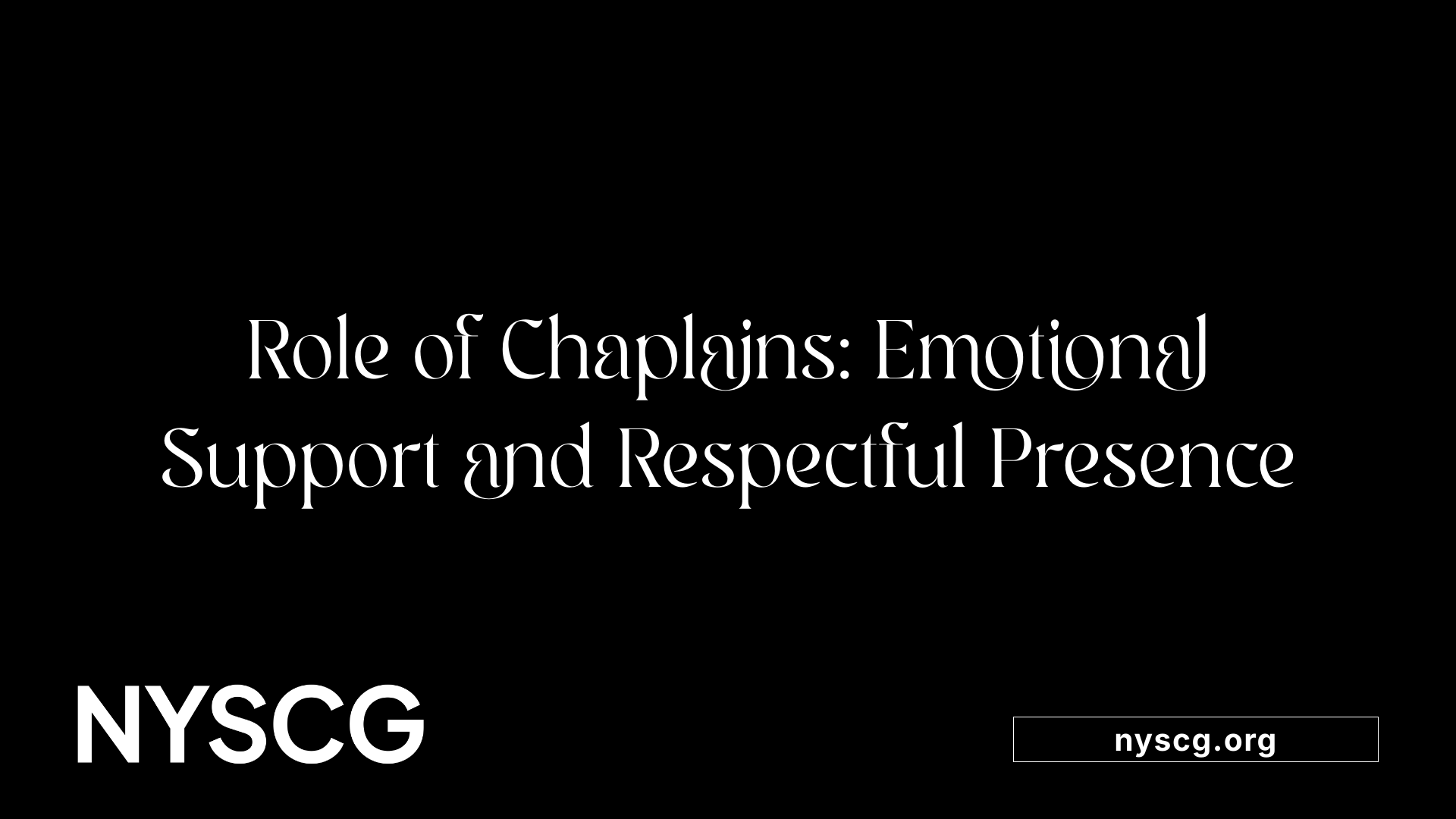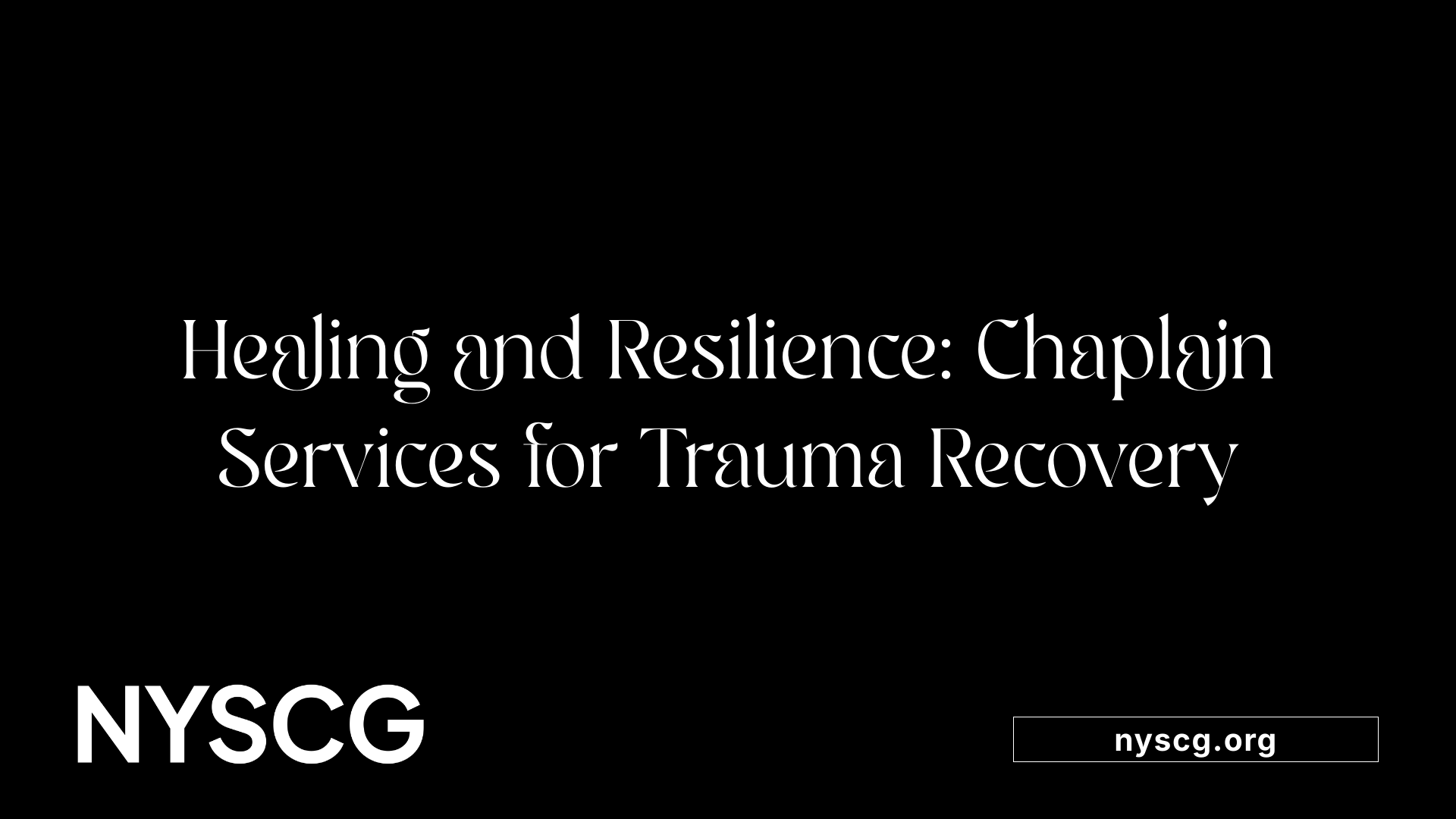What Happens When Chaplains Are Called to Crime Scenes


When tragedy strikes, the presence of chaplains at crime scenes and critical incidents offers a crucial layer of emotional, spiritual, and psychological support. Their involvement not only helps victims and their families cope with trauma but also bolsters the resilience of law enforcement personnel. This article explores the multifaceted responsibilities, procedures, and policies guiding chaplaincy work during these intense situations, highlighting how their compassionate presence makes a difference in the aftermath of tragedies.

Chaplains play an essential role during crime scene responses by providing vital emotional and spiritual support to everyone involved. They assist victims' families in processing grief and trauma, helping them navigate overwhelming feelings that often accompany traumatic events.
For law enforcement officers, chaplains offer critical crisis intervention. They help officers debrief after intense incidents, support their mental health, and provide counseling to cope with stress and emotional impact.
An important duty is conducting death notifications with compassion and care. Chaplains ensure that families are informed of loved ones' deaths sensitively before such information is made public, offering comfort and guidance during difficult moments.
Chaplains also support officers' spiritual well-being and mental resilience. Their presence during investigations and at crime scenes reassures staff and helps keep focus during emotionally charged situations.
In addition to emotional support, they assist with crowd control, help families access benefits, and often participate in funerals or memorial services to honor victims. Throughout their involvement, they assess the emotional needs of victims, families, and officers, offering reassurance without interfering with medical or investigative work.
Chaplains adhere strictly to department policies, maintaining confidentiality and operating within their defined roles. Their support is non-denominational and inclusive, serving individuals regardless of religious background, race, or social status to provide comfort and hope during times of crisis.

Chaplains play a crucial role during crime scene responses by offering emotional and spiritual support to victims, law enforcement officers, and their families. Their primary focus is to provide reassurance, comfort, and crisis intervention without interfering with the ongoing investigation.
When arriving at a scene, chaplains first assess the immediate needs of those affected, listening and offering empathy. They are trained to manage highly emotional situations, helping individuals cope with trauma and shock. Importantly, they ensure their presence does not contaminate or interfere with forensic or investigative procedures.
A significant activity involves conducting death notifications in a compassionate manner. Chaplains are often responsible for delivering difficult news directly to families and loved ones, providing ongoing support and guidance. Their approach emphasizes respect, sensitivity, and understanding.
In addition to emotional care, chaplains participate in crisis debriefings for law enforcement personnel. These debriefings offer officers a space to process traumatic experiences, reducing the risk of long-term psychological effects.
Apart from direct emotional work, chaplains frequently perform small humanitarian acts at the scene, such as distributing water, snacks, or meals to responders and victims, which helps sustain individuals physically and emotionally.
Throughout their involvement, chaplains maintain a careful balance—offering care and compassion while respecting the boundaries of formal law enforcement procedures. Their role underscores the importance of human presence and emotional support during some of the most intense and distressing moments in law enforcement work.
| Activity | Description | Additional Details |
|---|---|---|
| Providing emotional/spiritual care | Support for victims, responders, and families | Focuses on reassurance, hope, and crisis intervention |
| Conducting death notifications | In-person delivery of tragic news | Requires sensitivity and compassion |
| Scene support tasks | Distributing water, meals, comfort items | Offers physical sustenance during stressful times |
| Participation in debriefings | Assisting police in processing trauma | Helps officers maintain mental health |
| Non-intrusive presence | Staying quietly at scenes | Ensures emotional support without interfering with investigations |
Chaplains operate under strict departmental guidelines, emphasizing their supportive rather than investigative role. Their presence during crime scene responses highlights their commitment to human dignity amidst crises, ensuring that emotional and spiritual needs are met without compromising law enforcement processes.

Chaplains are vital figures in providing emotional, spiritual, and psychological assistance following traumatic incidents. They offer comfort through counseling, prayer, Scripture reading, and ritual activities tailored to the needs of those impacted. Their presence can bring hope and reassurance during moments of intense grief and confusion.
In addition to offering direct spiritual support, chaplains help facilitate communication between victims, families, and authorities. This ensures that families receive accurate information and feel supported throughout the crisis, especially during sensitive moments like death notifications.
Chaplains also focus on addressing moral injury and spiritual distress. They recognize the deep internal conflicts and spiritual struggles that often accompany trauma and work to help individuals find peace, meaning, and closure.
Their role extends to crisis stabilization—providing immediate intervention to help individuals cope and regain composure in the critical moments after an incident. Following the initial response, they continue offering ongoing care, facilitating recovery and resilience within the community.
Chaplains are trained with specialized programs such as the Certificate in Trauma & Spiritual Care and Clinical Pastoral Education. These training modules equip them with the skills necessary to support trauma recovery effectively, including recognizing signs of prolonged distress and trauma-related disorders.
Furthermore, self-care practices are emphasized to ensure chaplains maintain their mental well-being. They often engage in peer support, supervision, and professional counseling to avoid burnout and remain effective in their roles.
Chaplains undergo comprehensive education that combines spiritual care techniques with trauma-informed practices. They learn how to support individuals through the emotional and spiritual aftermath of tragedies. Skills such as active listening, de-escalation, and cultural competence are essential components of their training.
Regular participation in peer support groups and mental health seminars enhances their resilience. Physical and emotional self-care methods, including journaling, emotional distancing, and mindfulness, are encouraged to help them process their experiences.
This preparation ensures that chaplains can offer sensitive, effective care during some of the most difficult moments in individuals' lives. Their presence helps to foster hope and resilience, enabling communities to recover from adversity.
| Support Area | Activities and Approaches | Additional Details |
|---|---|---|
| Counseling and Spiritual Support | Prayer, Scripture reading, rituals, personal counseling | Customized to faith background and needs |
| Communication Assistance | Liaison between victims' families and authorities, information sharing | Ensuring clarity and compassion in messaging |
| Addressing Moral and Spiritual Distress | Spiritual counseling, reflection sessions | Helping individuals find spiritual peace |
| Crisis Stabilization | Immediate intervention, emotional first aid | First-response techniques for trauma crises |
| Ongoing Care and Recovery | Follow-up meetings, community support initiatives | Sustained spiritual and emotional health support |
This comprehensive approach underscores the importance of chaplains' roles in fostering healing and resilience in the face of tragedy.

Law enforcement chaplains are crucial during major crises like homicides, suicides, and severe accidents. They provide immediate support to officers, victims, and families facing traumatic moments. Their role includes offering confidential emotional and spiritual assistance, helping individuals process grief and trauma. Because of their training, chaplains are often present at crime scenes, funerals, and memorial services.
Chaplains assist with sensitive tasks such as delivering death notifications to families, ensuring these moments are handled with compassion and dignity. They support victims’ families by listening, offering comfort, and guiding them through complicated procedures. Their presence helps reduce emotional distress and offers a sense of hope amidst chaos.
Additionally, chaplains participate in critical incident stress debriefings and wellness programs. These efforts aim to foster resilience and mental health among officers and civilians alike. By providing a calm and grounded presence, they support long-term recovery and help prevent chronic stress or burnout.
Overall, law enforcement chaplains facilitate emotional healing, strengthen community trust, and bolster the resilience of everyone affected. Their work ensures that the personal toll of trauma is acknowledged and addressed with compassion and professionalism.
| Situation Type | Services Provided | Additional Notes |
|---|---|---|
| Homicide & Suicide | Death notifications, crisis counseling | Aimed at family and officers, respecting privacy |
| Accidents | Emotional support, victim assistance | Includes natural and traffic-related incidents |
| Natural Disasters | Support for victims and responders | Examples include mudslides and mass shootings |
| Mass Shootings | On-scene support, officer debriefings | Promotes resilience and community healing |

Chaplain services at crime scenes are guided by well-established policies that define their roles and responsibilities. These policies primarily focus on providing spiritual care, emotional support, and wellness services to law enforcement personnel, victims, and their families.
Confidentiality is a central element of chaplaincy practice. Information shared with chaplains is protected under privilege laws similar to attorney-client and psychotherapist confidentiality. This safeguard encourages open communication, allowing officers and victims to share their feelings and concerns without fear of exposure. Exceptions to confidentiality are limited, mainly involving serious threats to safety, where reporting is legally mandated.
Chaplains are trained professionals, usually with ecclesiastical endorsements and relevant advanced degrees. Their training emphasizes ethical standards of impartiality, cultural sensitivity, and nondiscrimination, ensuring they serve all individuals regardless of background.
During active responses to crime scenes, chaplains coordinate closely with law enforcement agencies. Their role involves providing support while maintaining strict confidentiality. They report only serious safety concerns or threats, as dictated by protocol. This careful balancing allows chaplains to be present as compassionate supporters without interfering with ongoing investigations.
Most chaplaincy programs incorporate ongoing training, certification, and adherence to legal and ethical standards. These measures safeguard the integrity of their role and ensure they are prepared to respond effectively during and after critical incidents.
Supporting mental health, resilience, and moral healing is a fundamental goal of chaplaincy at crime scenes. Their presence aims to foster emotional stability for both victims and law enforcement personnel, helping communities and individuals recover from traumatic events.
The involvement of chaplains at crime scenes and during critical incidents underscores their vital role in promoting healing, resilience, and emotional recovery for victims, families, and responders alike. Their presence—grounded in compassion, professionalism, and ethical integrity—helps individuals navigate the often overwhelming aftermath of trauma. As an essential component of law enforcement and emergency response efforts, chaplains continue to embody the values of empathy and hope, working tirelessly behind the scenes to ensure that no one faces tragedy alone.
All you need is the will to make the world a better place.
New York State chaplain group inc. is a tax deductible organization with a federal tax Id number 92-383-4921